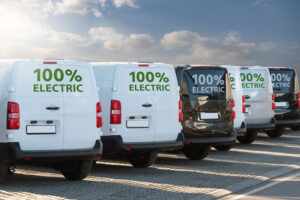Government publishes roadmap to decarbonising transport by 2050
Written by: , Last updated:30th May 2023

Decarbonisation is a truly global trend with which many governments are engaged. Only through limiting the amount of carbon produced by industry can we look to slow down the rate of global warming and protect our planet, and the concrete actions that must be taken by UK organisations in particular are now starting to be outlined.
The UK government has recently released their roadmap for decarbonisation; a 216-page report which seeks to promote the idea of ‘a better, greener Britain’.
In this article, we’re going to summarise what this report entails, while also touching on our area of expertise; fuelling commercial fleets, and also explore how this industry in particular is likely to be affected.
Why are we decarbonising transport in the UK?
There’s a strong consensus within the scientific community that greenhouse gas emissions are contributing to global warming, and there’s consequently a clear need for an initiative to reduce carbon emissions. Did you know, though, the transport sector in the UK is actually the worst offender?
In 2019, 27% of all greenhouse gas emissions produced by the UK came from transport, and so it’s no surprise that exploring more sustainable transport solutions is a priority in the proposed decarbonisation plans.
While there are various sub-sectors of transport, such as aviation and residential vehicles, the commercial fleet sector is proving to be a potentially huge opportunity area where progress can be made. Imagine if, for example, the thousands of petrol-powered lorries travelling hundreds of miles to deliver commercial goods were to switch over to the cleaner electric power offered by electric roads.
So, what is the plan?
The government’s proposal contains a lot of detail around how society as a whole can minimise its carbon footprint; from promoting walking and cycling regionally to reducing maritime carbon emissions. The key aims of the report, though, are to:
- Outline the principles by which the UK will operate; determining which core values and goals will underpin the UK’s approach for the foreseeable future.
- Explain the wider benefits of net zero carbon emissions.
- Map out the UK’s pathway to achieving net zero transport.
Some key takeaways include:
The decarbonisation of the freight sector
The latest data (2019) indicates that HGVs alone are responsible for 16% of the UK’s domestic greenhouse gas emissions. To combat this, up to £700m has been pledged to support the manufacturing of zero-emission vehicles, such as electric HGV fleets, which could revolutionise the transport sector.
Beyond vehicles, though, the government are also prioritising roads; promising £20m of investment into trialling zero emission road freight solutions. What exactly this will look like is yet to be determined, however we could plausibly see heavy goods vehicles powered by overhead electrified wiring on UK motorways, or potentially even charging infrastructure embedded into road surfaces that remotely charges vehicles.
There are also plans to prohibit the sale of non-zero emission HGVs entirely by 2040, which is also expected to yield benefits around noise pollution and air quality.
Improved infrastructure around electric vehicle charging
Beyond making the fantastic electric vehicle charging technology the UK currently has access to more widely available, it’s key that the UK remains at the forefront of research in this area. That’s why the government’s roadmap also commits up to £2.8 billion in support of R&D, the implementation of charging infrastructure, and financial incentives to help businesses and residential drivers make the switch to emission-free transport.
It’s expected that zero-emission vehicle manufacture could see around 60,000 new jobs created by 2030, particularly in Midlands and North East England manufacturing heartlands.
How will fleet operators be affected?
As a person responsible for the operation of a commercial fleet, whether that’s a consumer-facing taxi service or a freight operation, you’re likely to feel the real-world impact of new government legislation and policy over the coming years, which may include:
- The electrification of fleets.
- New electric battery technology.
- Bans or taxes on carbon-emitting vehicles.
It could be advantageous to keep a keen eye on any news relevant to your operation, and consider whether there are changes you can make to your business now, that could see you reducing costs, maximising profits, and improving on the sustainability front to ensure that your business model is fit for the future as much as the present.
How can Fuel Card Services help?
At Fuel Card Services, we completely understand the motivation of fleet operators to make efficiencies and reduce costs as much as possible. That’s why we’ve partnered with the UK’s leading fuel providers to offer a quality range of fuel cards that can save your drivers money on every litre.
Our fuel cards offer a range of unique benefits, with some including nationwide coverage while others offer flexible payment terms. Read our article on how to compare fuel cards if you aren’t quite sure which product is right for you, or contact our experts for further advice or a consultation that takes into account your business’ specific needs (and routes).
If you’re serious about making efficiencies, you may also enjoy our range of professional fleet services that are designed to make it easier for you, as an operator, to manage and overcome everyday challenges on the roads. Our services include:
- MyService.Expert – simplifying your vehicle maintenance and servicing. With our service, you can select from a range of garages near you and book in to gain access to our pre-negotiated servicing and maintenance rates.
- MyDriveSafe.Expert – Our app which enables the quick and hassle-free reporting of vehicle defects, and allowing your drivers to run through a series of easy-to-follow checks.
View our fleet services to sense-check your operation and see how we could help save you money.
back



